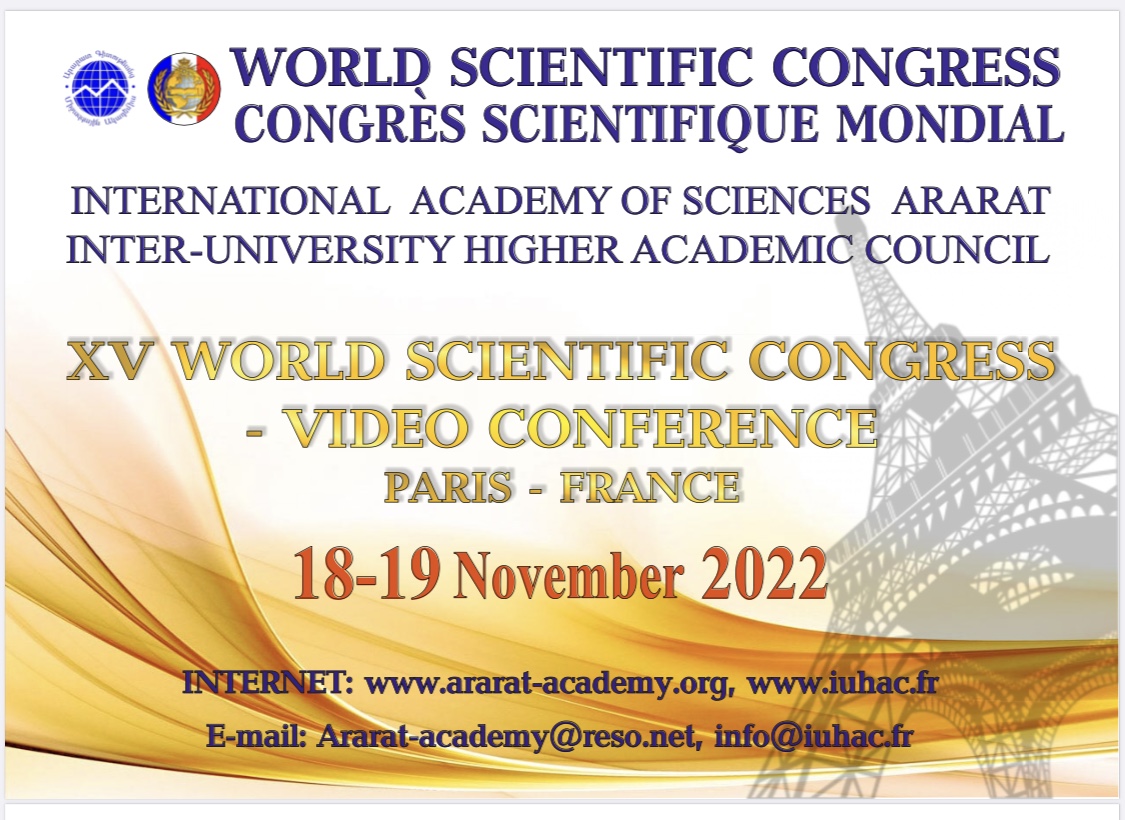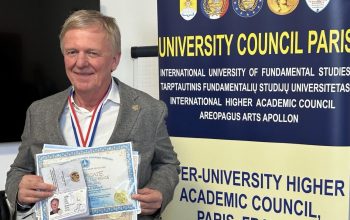PROGRAMME
XVI WORLD SCIENTIFIC CONGRESS -2022
ONLINE VIDEO CONFERENCE
November 18 and 19, 2022
Paris – Saint-Petersburg
SCIENCE FOR PEACE, GLOBAL ECONOMY
“MODERN SCIENCE: CONCEIVING AND IMPLEMENTING.”
Organizers:
International Academy of Science Ararat, France
Inter-University Higher Academic Council
In Paris
International University of Fundamental Studies (IUFS)
International Higher Academic Council
In St. Petersburg
The XVI World Scientific Congress will be held on November 18–19, 2022 in St. Petersburg in the format of an online video conference.
Venue:
10:00 a.m. – Start of registration of participants of the XVI Congress.
10:30 a.m. – The Congress begins.
The hours of operation are 10:00 a.m. to 6:00 p.m.
Welcoming speech:
The President of the Congress, Prof Agop Kerkiacharian , President of International Academy of Sciences Ararat, France , and Co-President of Congress, Prof; Santhi Jayasekera, Rector of the International University of Fundamental Studies, President of the Intergovernmental Academic Council (IUHAC)
The purpose of the Congress is to find solutions to problems arising in connection with the rapid development of science and technology, the widespread introduction of new technologies that affect the fate of humanity from a global perspective.
Today, people around the world are concerned about the crisis. After the long boom of the past decades, which has been called the “golden age of the world economy,” the first deep crisis of the globalization era has struck.
Today, as never before, it has become clear that humanity has deviated greatly from the natural path of its development, and the main reason for this imbalance in the relationship between the human population and the environment has been official science, purged of moral criteria and fragmented into many special directions, quite distant from the real problems of today. However, these problems are systemic in nature and affect primarily the holistic human worldview, i.e., if we take a broader view, the whole complex of interactions between the natural sciences and the humanities. It is no longer possible to address fundamental issues on a global scale by relying solely on the traditional basic sciences, i.e., physics alone, chemistry alone, biology alone, or mathematics alone.
Nowadays, just as thousands of years ago, scientific activity is based on trial and error, the essence of which lies in successively proposing and considering all sorts of ideas and looking for ways to implement them. Every time an unsuccessful idea is discarded, a new one is put forward in its place. There are no rules of search: any idea, even the “wildest” one, may be the key to the solution. There are no specific rules for the initial evaluation of ideas: whether it is suitable or not, whether it is worth checking or not – you have to judge it subjectively.
Once upon a time, problem solutions were chosen literally at random. But as technical knowledge evolved, ideas emerged about what was possible in principle and what was impossible. In accordance with these notions, the modern scientist filters the options, discarding what seems unsuccessful. Increasing the degree of filtering is the main trend in the historical development of the trial-and-error method. Filtering makes it easier to solve problems that have normal, i.e., more or less habitual, answers, and it makes it very difficult to solve problems that require non-trivial, “wild” ideas.
Another trend in the development of the trial-and-error method is the replacement of real experiments by mental experiments. The amount of knowledge available to the modern inventor is so great that the results of many trials can be predicted in advance.
All this makes it possible to theorize most of the options without resorting to real, physical experiments. Mental experiments are much faster, and that is their main advantage. But since mental experiments are subjective, they are not immune to psychological interference. Besides, mental experiments, unlike real experiments, as a rule, are not accompanied by unexpected side discoveries, the detection of all kinds of unforeseen phenomena and effects.
The XVII WORLD SCIENCE CONGRESS will be devoted to in-depth analysis and comprehension of these problems.
If you have any inquiries please do not hesitate to contact the Chief coordinator of the XVII World Scientific Congress and the head of Sri Lankan delegation Prof.J.S.K.Jayasekara, Vice-chancellor of IUFS university, on or before 05th of November 2022.



